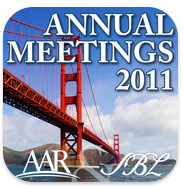 Duane of Abnormal Interests offers This Isn’t Kindergarten in response to James’ “Essential Languages for New Testament Study” which was, in turn, a follow up to Larry’s discussion of what languages are essential to NT studies. Duane ups the ante quite a bit. Any serious student of the first two centuries CE
Duane of Abnormal Interests offers This Isn’t Kindergarten in response to James’ “Essential Languages for New Testament Study” which was, in turn, a follow up to Larry’s discussion of what languages are essential to NT studies. Duane ups the ante quite a bit. Any serious student of the first two centuries CE
needs to know not only Hellenistic Greek, but more than a smattering of Aramaic, Hebrew (including Rabbinic Hebrew), Syriac, Coptic and Latin.
And if you are interested in Hebrew Bible, well let’s just say you better put your linguistic cap on.
A serious student will know Hebrew, Aramaic, Hellenistic Greek, Akkadian including peripheral Akkadian, Ugaritic, Phoenician, Egyptian, and Classical Greek. I think they also need know Hittite.
All of this glossolalia got me thinking about the fact that none of the authors of the NT or the HB knew all or likely even more than three of these languages. Most likely only knew a couple, which is still more than most people today, I will grant you that. But does Duane or any of us really think that the author of Ruth, for example, Akkadian or Ugaritic or Phoenician? Do we really think they knew historical grammar and the development of Northwest Semitic languages? Of course not.
I understand that for us as literary scholars, historians, theologians, archaeologists and the like we need to know a far greater breadth and depth than the author’s whose works we study. Often they are influenced in ways they were unaware of and that is often grist for our scholarly mill. Each scholar takes a different tack based upon our interests and training, some linguistic and others theological, and to investigate those niches we need specialized tools.
But it might just be worthwhile sometimes to remember the original context and the limitations and expectations of the author and his/her audience.





10 thoughts on “How many languages does it take to get to the center?”
Hi Chris,
Of course, I don’t think that the biblical authors knew nearly as much of some of the stuff we need to know to understand them. On the other hand, they knew a lot more than we can ever know about themselves and their culture. The reason is that much of their cultural environment was assimilated from sources and experiences to which we just don’t and can’t have access. For this reason, we need to be able to cast our linguistic, literary and cultural nets much wider than they did. We then need to be able to make well based judgments as to how this less direct material may represent some aspects of their self-understanding and their understanding of the material they worked with and produced.
Duane – all very fair points. We often do not know ourselves how “educated” we are, not to mention influenced, in our own writing. On the other hand, we tend to build up monuments of impediments to learning. More on that in my reply to TW.
I have just started my PhD in Religions of Western Antiquity, focusing mostly on early Christianity. I am required to know German, French, Classical Greek, Hebrew, Latin, and either Syriac or Aramaic (dependent on my research needs). It has become clear quickly though that I will also be expected to learn Rabbinic Hebrew and potentially Coptic. That puts me close to Duane’s expectations.
I think, though, that it should be done on a case by case basis. Should all students in biblical studies know certain languages? Yes. But there are “extra” languages, in my opinion, that are not so foundational as to merit saying someone cannot adequately understand the field they are working in if he/she doesn’t know them. I judge it this way: if I need to work on a text that was originally written in an ancient language that I do not already know, I need to learn that language to properly study the text. It is very likely, though, that someone can do good, meaningful scholarship in NT/Early Christianity (my field) and never have a need for Syriac or Coptic. Could his/her scholarship be improved by acquiring those language skills? Possibly.
I am by no means someone to shy away from learning a new language, but I think at some point there needs to be a utilitarian analysis of our language acquisition. Are we acquiring language skills so we can add the to a CV or are they legitimately informing and improving our scholarship?
By the way, I think this is a great conversation to be having and, having said what I have already, think we should ultimately defer these decisions to those who have gone before us and can help guides us on this part of our academic journey (i.e. as a newbie PhD student, I know I don’t have all the answers to these types of questions).
TW – I agree that there are clearly basic languages, skills, and abilities any scholar of a given literature or period must have. I also agree that there should be flexibility.
I did not approve entirely with how the D. Phil. was handled at Oxford in my day but what I greatly appreciated was the assumption that you would simply learn the basic skills needed for research and then build upon them. So if you needed to know Syriac to do your work you went out to learn it. In the US model we have a tendency to make our students demonstrate that they know all there is about a broad area before we let them through the gate. Why? Teach them how to fish and… you get the picture.
CB wrote:
Hmmm… “Most people” … really? I reckon your average rural illiterate central African villager knows probably four, maybe five.
It makes an interesting question, though. Are most people on planet earth bi-/multi-lingual? or mono-lingual? I expect the former, but that’s just a hunch. There’s probably an authoritative answer somewhere.
David, I would actually modify my “most people” to say that “most” were likely to only know one, if we assume most are rural. Of course none of us have any real data to back this up. I would doubt, for example, that “your average RURAL illiterate central African villager” really knows 4 or 5 languages. If they are truly rural, what other languages are they coming in contact with?
Of course central Africa does have an amazing explosion of languages. Places like central America are much more mono-lingual. Or so I am told. Like you, I imagine there is an authoritative answer somewhere, I just don’t have it. (This 1999 study revealed by Google, for example, suggests that most of the world’s population is, as you suspected, multilingual.)
My point is still that while, as others have pointed out, Hittite language and literature and culture may have influenced 7th century Judahite author’s without their being aware of it, it is highly unlikely that they knew Hittite or any Hittite literature.
CB: “If they are truly rural, what other languages are they coming in contact with?”
In the one village setting I know reasonably well, you could easily get English (of course), Chichewa, Timbuka, and Yao. That’s four for starters! I’d happily take you there for you to check for yourself! 😉
My hunch is that “we” (and this would I think be especially true in North America) vastly underestimate the linguistic diversity that most (?) of the world citizen’s live with!
I guess that’s why I ask how rural. Even a “rural central African” village today will have people visiting, not to mention missionaries over the centuries, who speak English, French, not to mention local dialects. But really remote communities where they have little contact with others? I would imagine a very limited language base.
To return to the era in question, while the biblical authors, clearly educated scribes, woudl know various languages for commerce and political engagement, I would think a “rural” Judaean community would have little contact with people speaking other languages. I could be wrong of course, but that hypothesis is behind the arguments of many who suggest that Hebrew did not die out with the exile, but lived on and that evidence of that is ultimately found in Mishnaic Hebrew. Needless to say, many disagree….
Oops! Forgot to close the italics markup in that previous comment.
And yes, the main point of your post strikes true. I’m just chasing an appealing hare!